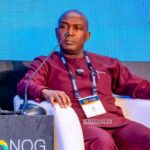… applauds Engr. Ojulari for breaking bureaucratic barriers with solution-driven leadership
… urges Africans to rely on local funding, says Western financiers lack incentive
Oredola Adeola
Dr. Ainojie ‘Alex’ Irune, Managing Director of Oando Energy Resources, has emphasized that the recent growth in Nigeria’s oil and gas industry is a direct result of a change in mindset among key players.
Irune, who represented Wale Tinubu, Oando Plc’s Group Chief Executive, during a strategic panel session at the ongoing NOG Energy Week in Abuja, on Tuesday.
He underscored the urgent need for innovation, bold investment, and local collaboration to secure Nigeria’s energy future.
Delivering remarks on the panel themed “Prioritising Energy Security,” Irune called on stakeholders to harness technological advancements and attract the right investments to unlock Nigeria’s full potential as Africa’s leading economy.
Dr. Irune appraised Engr. Bayo Ojulari newly appointed Group Chief Executive Officer of NNPC Limited, for his practical leadership approach and accessibility brought to the NNPCL.
He described Ojulari as a solutions-driven leader who is breaking down traditional bureaucratic barriers within the organization to foster more effective stakeholder engagement.
Sharing a personal experience, Irune recalled a recent encounter where he raised concerns about a particular operational issue.
According to him, Ojulari responded immediately and scheduled a meeting for that same Friday.
“Interestingly, there was no formal meeting, no conference room, and no PowerPoint presentations—we just solved the problem on the spot,” Irune said.
“What we’re witnessing is the result of people at the helm choosing action over formality. That kind of thinking is what drives true transformation in the energy sector.
“The regulatory environment must foster a sense of security and predictability that makes investment viable.
“Investors are unlikely to commit capital where there’s doubt about returns, especially in a market where oil prices fluctuate.
“Over the last five years, we’ve had to challenge the status quo and demonstrate resilience to maintain progress,” Irune said.
Dr. Irune further urged stakeholders within the African energy circle to look inward and seek local sources of funding, stressing that Western financiers are unlikely to support projects from which they do not directly benefit.
“Energy security means access to reliable and affordable energy for every Nigerian. We need to believe we are deserving of that security and invest accordingly.
“The West built infrastructure with that belief; Africa must now do the same,” he asserted.
Drawing parallels with countries like the United Arab Emirates, Irune noted that deliberate investment and a focus on empowering local economies have driven development. He also lamented the energy access gap between African and European children, calling for urgent action to close that divide.
Irune cited Oando’s agility in managing acquired assets, revealing that the company recently resolved a 3,000-barrel gas production decline without bureaucratic delays.
“We are the only indigenous digital company to acquire offshore assets at scale. It hasn’t been easy; it required organizational reshaping and the discipline to act quickly. Our response last week was proof that we walk the talk on energy security,” he said.
He reaffirmed Oando’s commitment to natural gas as a transition fuel, stating that the company currently supplies gas to power plants serving approximately half of Nigeria’s population.
“Power is central to our business model. We are investing heavily in gas to drive economic and community development,” he added.
Irune also highlighted the company’s clean energy ambitions, revealing that Oando is actively developing wind and solar power projects, some of which are already advancing through legislative processes.
“Clean energy excites us, but we must recognize that it will only succeed if it’s built on a strong oil and gas backbone. Today’s investments in hydrocarbons will deliver tomorrow’s sustainable energy future,” he said.
Addressing regulatory and security challenges, Irune acknowledged the complexities of Nigeria’s oil and gas operating environment.
“In the last five years, we’ve challenged norms around security and transparency. We must continue to ensure prompt payments, deepen community engagement, and commit to finding solutions. We can’t afford to turn away from the challenges, we must solve them,” Irune said.



